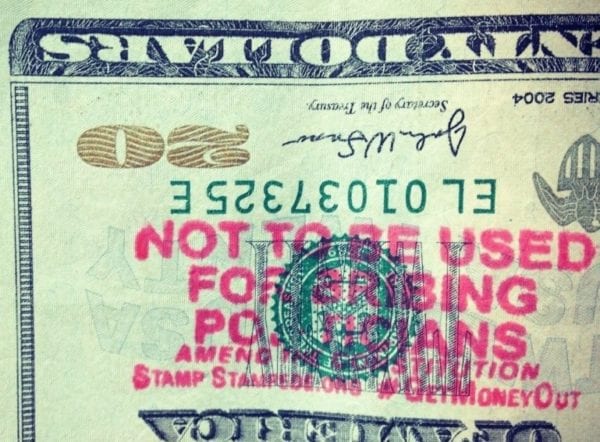
For those that cynically believe that politics is all about money, examples of corruption and bribery are all too easy to find in the news cycle. A federal grand jury in Missouri indicted Rusty Cranford, a former lobbyist, in early November 2019 on one count of conspiracy and eight counts of accepting bribes (“Ex-Lobbyist,” 2019). The lobbyist’s illegal activity all occurred while he worked on behalf of Preferred Family HealthCare (PFHC), a Missouri-based non-profit (“Lobbyist Sentenced,” 2019). Cranford also plead guilty to bribing three former state lawmakers—Jon Woods (Rep.), Hank Wilkins (Dem.), and Jeremy Hutchinson (Rep.). Notably, Hutchinson is Governor Asa Hutchinson’s (Rep.) nephew (“Lobbyist Sentenced,” 2019). Further, Cranford and PFHC executives embezzled over $4 million from the non-profit over the course of six years (“Ex-Lobbyist,” 2019). On November 25, 2019, a federal court sentenced Cranford to seven years in prison without parole and mandated he pay back over $3.7 million derived from the bribery scandal (“Lobbyist Sentenced,” 2019).
Cranford’s case is not the only example of clear-cut bribery tied to lobbying activity. Many in the United States hear “lobbyist” and think of Jack Abramoff, who bribed members of Congress (Williams, 2018). In 2016, Todd Howe, plead guilty to eight counts related to a bribery scheme in the state of New York and received five years of probation (Ramey, 2019). Illinois State Senator Martin Sandoval plead guilty in 2020 to bribery and tax charges for taking money from a red-light-camera company to work on their behalf as head to the Senate’s Transportation Committee (Meisner, Crepeau & Mahr, 2020). Bribing public officials is unquestionably illegal and lobbyists and representatives alike pay the price for these violations. But is the line between illegal bribery and legal but unethical lobbying practices always so clear?
Former-lobbyist Jimmy Williams argues most lobbyists are not like those above; instead, they “are engaged in a system of bribery but it’s the legal kind” (Williams, 2018). He describes this legal system as one “of sycophantic elected leaders expecting a campaign cash flow, and in return, industry, interest groups, and big labor are rewarded with what they want: legislation and rules that favor their constituencies” (Williams, 2018). Williams argues that lobbyists essentially pay for representatives’ time and votes by attending expensive fundraisers and donating to PACs and campaigns—with the fundraisers and donations often immediately preceding the meeting or the vote.
Others argue that “political influence is not that simple” (DeLancey, 2018). Lobbying is predicated upon personal relationships among lobbyists, legislators and their staffs, corporations, and non-profits and advocates. These relationships are potentially supported by donations, which are “seen as a show of support between the lawmaker and the lobbyist because they share common goals” rather than a payment for time or legislative action (DeLancey, 2018). Lobbying is not a direct exchange of money for votes; it is a strategic and interpersonal communication process where interest groups employ professional advocates to push their concerns to legislators and policy makers. In their line of work, lobbyists may make a donation to a lawmaker, but so can any other citizen or constituent. Despite the two dominant U.S. political parties’ complaints about lobbyists, they both use their efforts and their money. Moreover, lobbyists are “simply doing their jobs, and those jobs are not only legal but protected by the First Amendment” (Williams, 2018). In remarks during the 2007 campaign, then-Senator Hillary Clinton noted that lobbyists are not bad, per se, since they also represent nurses and social workers (Smith, 2007). One could see her point—hired lobbyists represent groups that often lack a voice among those in power, including teachers’ unions, civil rights organizations, and healthcare workers. Somewhere in Washington, D.C., there is probably a lobbyist working on behalf of a cause each of us cares about. But the reality remains: many lobbyists work for large and powerful corporations pursuing their own goals, and not for groups interested in the public good.
What exactly is worrisome about the connections of lobbying, monetary support, and issue influence? The narrative that lobbying is or comes close to legalized bribery itself carries ethical concerns for U.S. democracy. As a former non-profit lobbyist argues, “if people believe that our politicians are simply pawns, controlled by the highest bidder, then people will not think that individuals can make a difference” (DeLancey, 2018). But perhaps ordinary individuals can matter if they simply play the same game. The organization “Lobbyists 4 Good” has even gone so far as to crowdfund from everyday people to hire lobbyists on behalf of citizens rather than corporations. These concerns are magnified by popular and press discourses that do not accurately distinguish between bribery and lobbying. For example, amidst coverage of escalating tensions between Iran and the United States in December 2019 and January 2020, multiple sources argued Democratic legislators were bribed illegally by the Iranian government in 2015 to support the Iran nuclear deal (“Donations, Not Bribes”, 2020). These claims were false; legislators from both parties accepted “donations from an Iranian American political action committee” that lobbies on behalf of Iranian Americans and which “cannot legally accept money [from] foreign governments or companies” (“Donations, Not Bribes”, 2020).
Lobbying is a key way citizens—including those running large corporations—exercise their right to be heard, but some commentators like Williams (2018) are concerned that money is becoming the most heard form of political speech and that without it, voices are easily ignored. As the jaded former lobbyist summarizes, “those with the most money have the largest voices. Those with the least are rarely part of the process. That makes the legality of the practice of lobbying less relevant because it’s an uneven playing field” (Williams, 2018). Some would argue Williams’ critique is particularly astute in light of the 2010 Citizens United Supreme Court decision ruling restrictions of corporate campaign donations are unconstitutional because giving money is a form of political speech and is thus protected by the First Amendment (Gangitano, 2020). These corporations can now donate more—an exercise in protected political speech—to enhance their lobbying efforts, “but the ruling also opened the door for labor unions and nonprofits to ramp up their campaign spending” in much the same way (Gangitano, 2020).
Many have recommended changes to lobbying regulations to mitigate these issues. The Organisation for Economic Co-operation and Development (OECD) released a report of recommendations for member nations to ensure integrity and transparency in lobbying practices (Organisation for Economic Co-operation and Development, 2014). The question is whether the implementation of these standards would eliminate potential ethical problems or simply make the immoral practices more transparent. Lobbying at its best is “a positive force in democracy” since it potentially represents a powerful way that individuals and groups can communicate their interests to legislators in a focused and strategic manner. At its worst, however, lobbying can also function as “a mechanism for powerful groups to influence laws and regulations at the expense of the public interest” (Organisation for Economic Co-operation and Development, 2014). How can we enable ethical practices of persuasive advocacy with politicians given the all-too-real risks of lobbying practice?
Discussion Questions:
- What ethical values are in conflict in the debate over lobbying? Are there democratic values that both speak for and against common lobbying practices?
- What are the ethical distinctions between direct bribery and using money to bolster influence? How are bribes different from gifts?
- Is lobbying inherently unethical? If not, what differentiates ethical lobbying from unethical lobbying?
- Does being an ethical lobbyist mean you are less effective in some instances?
- What are some important ethical principles that lobbyists should not violate?
Further Information:
Billy DeLancey, “No, lobbying is not bribery.” Lobbyists 4 Good, March 1, 2018. Available at: https://www.lobbyists4good.org/single-post/2018/02/27/No-Lobbying-Is-Not-Legalized-Bribery
“Democrats took donations, not bribes, from US lobbying group.” Associated Press, January 6, 2020. Available at: https://apnews.com/afs:Content:8363260371
“Ex-lobbyist faces Nov. 25 sentencing for Arkansas bribery.” ABC News, November 13, 2019. Available at: https://abcnews.go.com/US/wireStory/lobbyist-faces-nov-25-sentencing-arkansas-bribery-66983791
Alex Gangitano, “Citizens United decision weathers 10 years of controversy.” The Hill, January 21, 2020. Available at: https://thehill.com/business-a-lobbying/business-a-lobbying/478852-citizens-united-decision-weathers-10-years-of
“Lobbyist sentenced to 7 years in Arkansas corruption scheme.” Associated Press, November 25, 2019. Available at: https://apnews.com/bec0549fb6a84c9aa301a9168a2fb6a1
Jason Meisner, Megan Crepeau & Joe Mahr, “Guilty plea lays bare ex-state Sen. Martin Sandoval’s greed in red-light camera bribery scheme. ‘So why don’t I get that offer?’” The Chicago Tribune, April 2, 2020. Available at: https://www.chicagotribune.com/news/criminal-justice/ct-ex-state-sen-martin-sandoval-guilty-20200128-xhgdh565ejaqla7lfjnxcpb2n4-story.html
Organisation for Economic Co-operation and Development, “Lobbyists, Governments and Public Trust, Volume 3; Implementing the OECD Principles for Transparency and Integrity in Lobbying.” The Organisation for Economic Co-operation and Development, November 27, 2014. Available at: http://www.oecd.org/corruption/ethics/lobbying/
Authors:
Dakota Park-Ozee & Scott R. Stroud, Ph.D.
Media Ethics Initiative
Center for Media Engagement
University of Texas at Austin
September 1, 2020
Image: PxHere / CC0 1.0/ Modified
This case study is supported by funding from the John S. and James L. Knight Foundation. It can be used in unmodified PDF form for classroom or educational settings. For use in publications such as textbooks, readers, and other works, please contact the Center for Media Engagement.
Ethics Case Study © 2020 by Center for Media Engagement is licensed under CC BY-NC-SA 4.0



